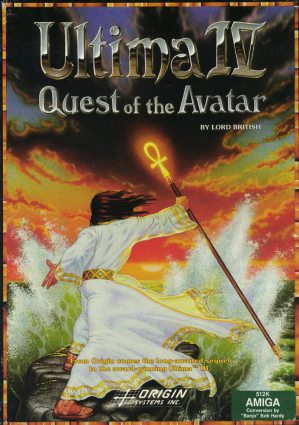Report thy feat unto Lord British
Welcome to yet another working-from-home pandemic episode of Fun For Friday Fabulous Adventures. Over the past while I've gradually been looking for music, movies and games I enjoyed as a teenager and seeing how they hold up. So I am pleased to announce that it took me only 35 years to finally complete a game I started on my Commodore 64 in 1985:

If you are unfamiliar with Ultima IV: it was an incredibly influential game that moved the state of the art forwards in swords and sorcery" style games. The world was, for its time, enormously detailed, full of characters you could interact with who gave you clues as to the various puzzles you had to solve to win the game. Those puzzles largely took the form of fetch quests" - you need eight magic stones hidden in six dungeons, and the mantras of eight shrines and the Bell of Courage, and so on; there's quests built upon quests upon quests.
But the most interesting thing about Ultima IV was that it was the first game I played, and maybe the first game ever, to not just build in a moral system, but to make it the object of the game. The central design element is to not just reward, but require the player to be just, honest, compassionate, honorable and humble within the context of the game, and the quest is ultimately for wisdom. It was an astonishing achievement in a world where the object of all previous fantasy games was kill the big bad guy".
Other aspects of the game design are interesting by contrasting them to game design today. The game assumes, for example, that you have read the detailed (and well-produced) manuals that came in the box. It assumes that you're reading the (cloth!) map and deciphering the runic lettering on it. This would not typically fly today; we expect games to introduce players gradually, to have a tutorial mode built into the game itself, and to not rely on anything exogenous to the software.
It's a hard game to win without help. I remembered a great many details from my teenage years, and I knew that I could just look up all the mantras and locations of secret items and whatnot on the internet, but I decided to play it more or less like I did not have any of that information ahead of time. I did read some walkthroughs of the harder dungeon levels, because figuring out where all the secret door triggers are is tedious.
Ultima IV is available for free from GOG, and the rest of the series is cheap, so I encourage you to give it a shot if you want some of the retro gaming experience that informed modern fantasy game tropes.
Spoiler ahead:
If you do, there's a bit of a cheat that I wish I'd remembered: once you are an Avatar and have the Mystic Robes, you can sell them, use the proceeds to buy magic wands and bows, and then find the robes again in the same place you found it the first time. That takes out a lot of the tedium of trying to get enough gold to afford magic ranged weapons. And don't waste your money on magic armor; just get the Mystic Robes sooner rather than later!
The game ends with an exhortation to contact game author Lord British, also known as Richard Garriott, who amazingly is still making fantasy games that come with cloth maps in the box. I'll have to order a copy and see how the series has evolved in the last 35 years.
Back in the 1980s if you did contact Lord British after winning an Ultima game, he would send you an autographed certificate of completion, but sadly I suspect I will not be getting one.

I also had Ultima V for my Amiga but I never got very far in it. Perhaps I'll give it a shot next.